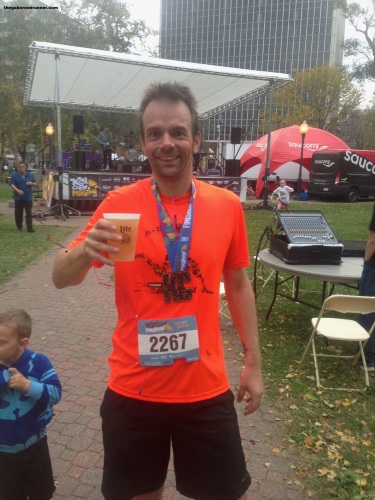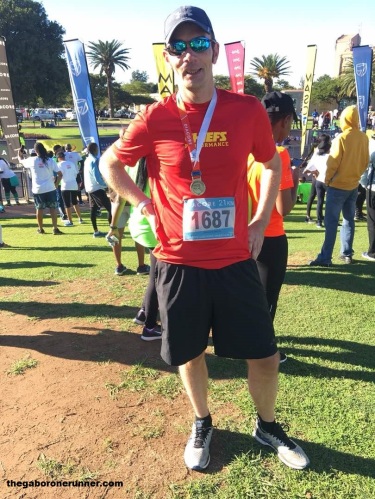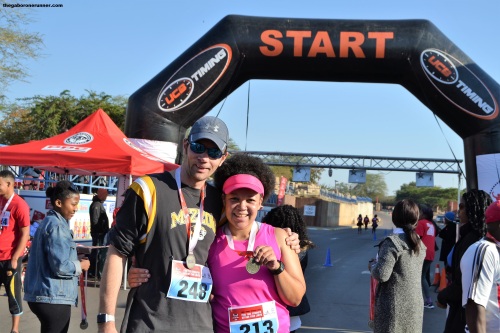When I was on my mission to run 17 races last year, I got a knee injury after my 6th race. I felt so sorry for myself but after a few physio sessions, I returned to running. My minor injury though pales in comparison to what my friend Johannes went through. On Boxing Day last year, we got a call that he had been involved in a near-fatal motorbike accident. For the ten years I have known Johannes, he has been so active and running has always been such a huge part of his life. His “race resume” is extensive and he has run several races in Botswana, South Africa, the USA, Zimbabwe, and the Netherlands.

When I heard the extent of his injuries, I honestly did not think he would be back to running any time soon. But unbelievably just five months later, he ran the Diacore Half Marathon in 1:53.06 hours. I was gobsmacked. In his own words, this is the incredible story of how he overcame his injuries and fought back to fitness.
Can you briefly tell us about your accident and the injuries you incurred? On 26th December I was involved in a motorcycle crash in Gaborone. We crashed into the side of a car, who unexpectedly turned into a junction I was crossing. I have significant damage to my face (broken jaw, broken nose, broken cheek bone, broken teeth, and a few other breaks/cracks), I crushed my wrist, cracked my pelvis. I was taken to Bokamoso Hospital in critical condition, and because of the damage to my face the A&E doctors struggled to keep me alive and stabilise me when I first came in. I was struggling to breathe, due to the broken nose and the blood choking me. I was in ICU and in an induced coma for 5 days.
What surgeries did you have and what did your recovery programme look like? I had face re-construction surgery, wrist reconstruction surgery and some urological surgery done. I was in the operating theatre for 3 ½ hours in total. As soon as I was released into the general ward the physio started, first simple exercises to help me re-gain balance, such as walking on the treadmill, small exercises (with weights on my ankles) on/off a step, walking up down the hospital stairs etc. Once out of the hospital, the main physio was for my wrist and my face. For the cracked pelvis (which caused numbness in my foot for some time) I was encouraged to keep active, but the swelling and discomfort in my face made it hard to start sports again. There was no real recovery programme scheduled for me, and I found myself constantly asking the doctors what I “could do”, wanting to get started on some sort of exercise. Walking was what was agreed as the best way to keep active, and I found myself going for long walks a few times a week, or even walking on the treadmill at home with the setting on highest incline, to get some exercise started.
You said previously that “my running and body condition kept me alive” – can you expand on that? When I came into the hospital I was in critical condition, and struggling to stay alive. One of the reasons I made it through (according to the doctors) was that my body was in such good physical shape, and able to handle endurance without giving up.
As someone who was so used to being fit and active, how did you feel about your injuries? It was depressing. Exercise is a way for me to relax my mind, deal with the frustrations and stresses gathered from work. I really was missing this “outlet”, which is why I wanted to get back to exercising so desperately. The added issue was the frustration of the injuries, not being able to do certain things, the discomfort etc. My wrist was in a pretty bad state (even now it still hurts and is not at full strength) and temporary dentures are very uncomfortable. I am an impatient person, and want things to be fixed and back to normal immediately, but healing takes time.
What activities did you do while being injured? I did a lot of walking, I had a lot of time taken up with medical related appointments, and aside from that I just threw myself at work obligations, just to keep occupied.
How did you get back into running? I had registered (before the accident) for the Om-die-Dam Half Marathon (South Africa) in March, the Rock the Parkway Half Marathon (USA) in April and Diacore in May. I knew the first 2 races were too soon and I had to cancel them, but I felt Diacore was achievable, and I set my mind on that one as a preparation for running. My biggest problem was the facial swelling, and discomfort this caused when trying to run. I wanted to start, but also wanted the swelling to go down, and it would get worse with running from the vibration. I do a lot of my training (twice per week) at the track at UB stadium in the evenings, and I was going there during my recovery just to walk laps (while listening to podcasts – walking laps can get really boring). On 12th of March I went to go walk, and after a few laps I had enough of the walking, and just started running. The pain (in my face) was quite bad the first few laps but I didn’t care, I wanted to get going. I found that after a few laps it went sort of numb, and was less painful. I ended up running 6 km that first day (at a very slow pace) but felt like I had done a marathon when I finished. From there (once I knew I could run again) I put a schedule together with the aim to finish the Diacore half marathon in under 2 hours (I ran 1.41 last year, and my PR for half marathon is 1.39, but I knew I had to adjust my expectations).

On some of your darkest days, what kept you focused and positive on getting back to fitness? My darkest moments were in the hospital actually. Maybe the very strong painkillers were also messing with my mind, but I was wondering what I would be able to do, and when. Would I ever be able to run again? The people (doctors/friends) were telling me I would be running races before the end of the year, but I was not sure if I could believe them. During those times it was really the people around me that kept me positive. As soon as I came out of hospital I was desperately looking for progress/improvement. Getting my dentures, my first solid meal, getting stitches out, starting physio etc. This continued when I started moving around again, my first time driving a car (I had to borrow an automatic for a while, as I struggled to shift my manual car). Then once I started running, the progress (faster times, longer distances) really helped me, I remember the first 10 km training run I completed again, and how great it felt. But also my other sports, like my first time playing ultimate Frisbee again, my first tennis game back.
Do you have any words for those who may be struggling to get back into running after a huge setback? Change your expectations. I was very disappointed at first with not being able to run the distance or pace I used to. But rather than focusing on what you cannot do, celebrate the achievements and improvements. That creates so much motivation to keep going. Secondly: listen to your body. You know your own body the best. I found doctors will always be cautious, tell you it is better to wait, let your body heal. I felt I knew what I could do, how far I could push, but I also knew when to stop. And unlike when training normally, when sometimes I push through a pain or discomfort, I did know that when something did not feel right it was better to stop and try again the next day.
What did you learn about yourself when injured? That I am a very impatient person. But also that I have quite a high tolerance for pain.
Is there anything else you would like to share? I am very grateful to the doctors and staff and Bokamoso, who put me back together after this crash. People I speak to always ask “so did you go to South Africa?”. I had no choice after the accident, as it was an emergency, but there is no need for such consideration if you ask me. Botswana has some fantastic health professionals (or at least the ones that worked on me) and we should be proud of that.
Thank you Johannes for sharing this incredible story with us. Every time I see you running I am filled with a sense of pride. Your story is one of courage, determination and will power. It is a story of what the human mind and heart is capable of even in times of complete darkness. Your running story is far from over…

I am linking up with Marcia, Patty and Erica for Tuesdays on the Run! Be sure to visit their blogs for some awesome running stories.

WOW. What a story. Amazing how much damage he survived and has recovered from.Thank you for sharing his story
LikeLiked by 1 person
Thanks Cari! I am so glad he agreed to be interviewed – I just know he will inspire so many others who are experiencing some kind of setbacks in running or life in general. So much damage and yet he just pushed through step by step.
LikeLike
That’s such an inspiring story!
LikeLiked by 1 person
I am so glad he shared it. It really is inspiring.
LikeLike
What a great story!!!!! I’m so glad he has had pretty much a thorough recovery 😉 His advice about adjusting one’s expectations is crucial…we all have to learn to be objective to what our bodies can do. Even if we know they are capable of far more, we sometimes need to accept what they can do on that particular day if the circumstances are compromised. What an inspiring post!!
LikeLiked by 1 person
I love this story because it’s just another example of what we can achieve in the most terrible of circumstances. I honestly never thought he would run again so to see him at Diacore was truly amazing.
LikeLike
Wow! I am so impressed with his tenacity! I’m sure his runner’s mindset helped with his recovery. I totally get the impatience–that would be me wanting to get better and moving again. Thank you so much for sharing this!
LikeLiked by 1 person
I reckon his runner’s mindset had so much to do with it! I am so glad he agreed to share his story. Thanks for stopping by Wendy! 🙂
LikeLike
That is a crazy and scary story! So glad to hear that he is ok and back at it. The power of running is real
LikeLiked by 1 person
So scary. Getting that phone call was horrendous – still can’t believe he is out running already and doing so well. You said it beautifully – “the power of running is real”.
LikeLike
Wow what an inspiring story. I’ve heard this before: That people who are runners are able to withstand trauma better because of their endurance/fitness. How wonderful your friend was able to make such a beautiful comeback!
LikeLiked by 1 person
It really puts things into perspective – that we are running for more than just the love of it or the medals, but fitness and strength.
LikeLike
No words just had tears!! This is a brilliant post – inspired and motivated 🤗
LikeLiked by 1 person
There are no words. I knew the story but even when I did the interview, I was gobsmacked all over again. And inspired.
LikeLike
What an incredible and inspiring story! Thank you for beautifully writing his story and as you said ….I have a feeling, he’ll be running for many many years!
LikeLiked by 1 person
I am so glad he agreed to do it – and I just know his story will help someone who really needs it out there.
Oh yes! There really is no holding him back now!
LikeLike
Amazing story! Thank you for sharing!
LikeLiked by 1 person
Thank you. SO very proud of him.
LikeLike
Wow Wow Wow! I am so impressed by your friend. What an incredible story of hard work and perseverance. I hope that he continues to share his story to encourage others. He’s an amazing man
LikeLiked by 1 person
He needs to keep sharing in different contexts. I just know there are so many people out there facing obstacles who need someone to look up to. Seeing him out there racing and knowing what he has been through… it shocks me each time.
LikeLike
Thanks so much for sharing that incredible story! I’m sure that so many people who are struggling will be encouraged by that.
LikeLiked by 1 person
Thank you – after his Half Marathon I just knew I had to ask him to share his story. It truly is incredible and I know his story will encourage so many out there.
LikeLiked by 1 person